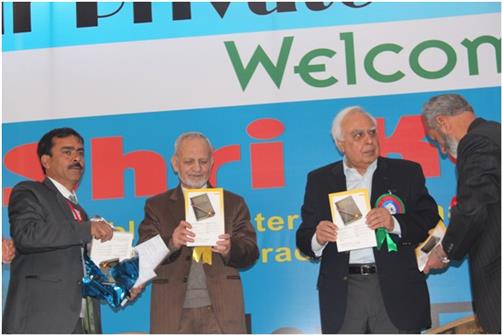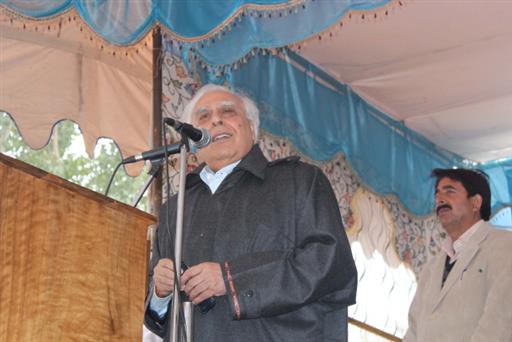


A day long interaction with Shri KapilSibal in KCEF Waheed-ur-Rehman It was a historic day for Kashmir in general and Pulwama in particular when on 23rd of October 2012, Union Cabinet HRD, Minister Shri Kapil Sibal interacted with Kashmiri youth--a large number being students and teachers-- and talked to them on “The New Education Policy of India: What it Means for Kashmir”, facilitated by Professor Madhu Kishwar. We consider the occasion historic for the following reasons: 1. Central ministers have thus far visited Kashmir only at the instance of Central or State government. Consequently, they address mostly sanitized sarkari functions. They do not venture out of carefully sanitized venues in Srinagar nor engage openly with the people. But Mr Sibal was hosted in South Kashmir which has been dubbed as a citadel of militancy in the Valley. And yet he was given a rousing welcome. This was perhaps the first time that a Central Minister accepted an invitation from a private organization and was hosted in the KCEF College campus. This created unprecedented enthusiasm in the Valley. Kashmiri have always felt aggrieved by the fact that while people in India keep chanting that Kashmir is an integral part of India, neither people in the government nor civil society organizations ever include Kashmiri in dialogues and discussions on national policies. This was the first time a central minister came to discuss directly with the people of Kashmir, important progressive aspects of the new educational policy being set into motion by Mr. Sibal in his role as HRD Minister in the rest of the country, while Kashmir educational policy remains trapped under the most vicious statist controls which are threatening not just the health but the very existence of private colleges and even private schools in Kashmir. 2. During the present regime whenever a Central Minister or high functionary of the central government visits Kashmir, the state government deliberately prevents direct contact with people by carefully screening people who are to attend the meetings addressed by the dignitary. Curfew like conditions are imposed, causing further alienation. Despite all such neurotic precautions, people manage to vent their anger against the state and central government by black flag demonstrations and anti-India slogans. For instance, when the President of India, Mr. Pranab Mukherjee visited Srinagar on September 26 2012, the state government spent a whole month screening through elaborate police enquiries, the few hundred students who were allowed to attend the address he gave in Kashmir University. As if that was not enough, there were as many policemen and security personnel posing as students by dressing up in civilian clothes. The Kashmir University Campus was virtually shut down for students and taken over by security agencies for the day. Despite all these paranoid precautions, students managed to stage a black flag demonstration when Pranab Mukherjee stepped out after delivering his speech. Similarly, when the state government had organized a meeting of Kashmiri students with Rahul Gandhi who came visiting the state with some business tycoons of the country, curfew like situation was imposed in Srinagar. The security arrangements were formidable. The Kashmir University campus was turned into a garrison for days prior to the visit. When Rahul Gandhi addressed a hand-picked group of people in the campus, Despite all this students managed to cock a snook at the security establishment by playing the Pakistani national anthem outside Allama Iqbal Library within the Kashmir University campus. They also chanted anti-India slogans in reaction to the harsh behavior of the state. Youth listened to minister Kapil Sibal with close attention By contrast, the interaction organized by the PCA & KCEF College of which I am an active part, was in an open ground without any offensive security screening of the 4000 plus youth who attended the function. Mr. Sibal was given a red carpet welcome and received with great warmth and enthusiasm. Students lined up to shower flower petals on him. They had also prepared an elaborate cultural program in his honour. 3. This event demonstrated that Kashmiri people are more than willing to set aside their deep political grievances and path of confrontation in order to engage creatively with those who genuinely care to listen to them and sincerely address their problems. Prof. Hamid, Prof. Ab Wahid- Vice Chancellor of Kashmir Central University introduced chief guest, Minister Sibal as well as the guest of honour, Prof. Madhu Kishwar to the audience. He expressed the hope that this historic open interaction would pave the way for resolving some of the pressing problems being faced by the private educational sector in Kashmir on account of the hostile policy. He also expressed the hope that Kashmir would be made an active partner in the progressive educational reforms being introduced in the rest of India. Thereafter, Mr. Chuni Lal Vishan, president of the Pvt. Colleges Association took the stage and provided a brief account on affairs of education. He expressed the hope that the central government would not use the alibi that “education is a state subject” for disowning responsibility for helping the private colleges and schools in Kashmir in putting an end to the highly irrational and discriminatory policies followed by the state government. This was especially important since private colleges and schools had kept the banner of education flying even when insurgency was at its peak and government schools and colleges were virtually shut down. Very few people know that even during those dark days, thousands of students came from other states of India—notably Punjab, Haryana, Rajasthan, UP etc—to get admitted to private colleges of the Valley because they provided better quality learning than most private colleges in their own state. He said that apart from putting absurd restrictions on the number of students that private professional and arts colleges can admit, the state government is also making it virtually impossible for students from other states of India to get admission in Kashmir despite an active market demand from the student body. Prof. Madhu Kishwar began her address to the gathering by saying that thus far she has been engaged in the livelihood battles of the poor, marginalized sections of Indian society such as street vendors, rickshaw pullers, traditional artists, artisans, farmers etc. But after being exposed to the problems faced by the otherwise versatile private education sector in Kashmir, she felt that their problems are no less acute than that of street vendors or rickshaw pullers. The policies of the state government in fact amount to waging a virtual war against private sector colleges. She said, in this case the problem is not just of protecting the livelihoods of or economic interests of private colleges’ managements but the right to education of lakhs of students of J&K as well as of other states who gravitate towards these institutions to improve their educational prospects. She commended the fact that most private colleges in Kashmir are run by academic entrepreneurs—many of who have studied in and taught in prestigious institutions in various parts of India. This is in sharp contrast to private sector colleges in other states which are run by politicians of dubious academic credentials. That was an additional reason why these deserve all possible help. She commended the fact that over 50% of the gathering consisted of young women. This is rare for public meetings or apolitical gatherings in India. Mr Sibal wearing the Kashmiri phiran presented to him by Shah Faisal, 2010 IAS topper from Kashmir Kishwar speech was followed by Minister Sibal being felicitated with a traditional Kashmiri phiran by the 2010 IAS topper from Kashmir Mr. Shah Faisal. Amidst enthusiastic applause Mr. Sibal began his speech by emphasizing on the vital role he expects the private educational sector to play in achieving the national goal of having at least 30% students enrolled in institutions of higher learning by the year 2020. Since government institutions do not have the ability to achieve this target on their own, private institutions are sorely required to fill in the gap. He assured the gathering that he would extend all possible help to them, both as a minister as well as in his personal capacity given the legitimate concerns they had brought to his notice. He even assured them help in fighting their case in the Supreme Court of India since the High Court of J&K had let the case drag on for years. Mr. Sibal concluded his speech by reading one of his poems named “Prejudice” which poignantly describes the predicament of the Muslim community which is being viewed with suspicion and hostility on account of the misdeeds of a small minority who have taken the destructive path of terrorism. This at once established his close rapport with the audience since a major complaint of Kashmiri students, businessmen and professionals who have moved to other states of India in search of educational, business or career advancement is that they are all treated as terrorist suspects. Many innocents have been nabbed by the police and subject to frequent harassment. Most important of all, there was a lively Q&A session at the end of Mr Sibal speech. Not a single question was hostile or dismissive. Each person who took the mike to respond to Mr Sibal speech asked pertinent questions and he gave thoughtful answers. While giving the vote of thanks to Mr. Sibal for his unprecedented gesture of coming all the way to Pulwama to speak to the youth of the Valley, I pointed out that if Tamil Nadu is allowed to have 92 deemed universities run by the private sector, Karnataka has 300 private engineering colleges, why can’t Kashmir be allowed to become a major educational hub for the country through creative participation of the private sector? Why is Kashmir private educational sector being trampled upon? Why are Kashmiris always treated with suspicion? I think I represented the sentiments of most of those (Youth) gathered when I concluded by saying: “India has to make up its mind. Either love or leave us”. At this Mr. Sibal spontaneously got up and said in the mike:” We love you and no question of us leaving you.”Before leaving Mr Sibal laid the foundation of womens hostel in the KCEF campus.
